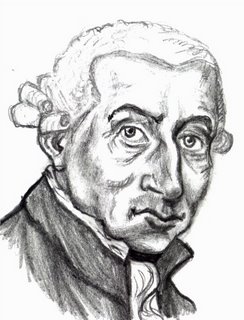Kant

David Hume had left the upper floors of Western philosophy in a most untidy state with the publication of An Inquiry into Human Understanding in 1740: standing ruthlessly on the principle that all knowledge is based on experience, Hume argued that the concept of Causation, among other bedrock concepts, was an unsupportable belief, since it could never really be experienced. While this (almost nihilist) declaration might have been akin to a market crash leading a number of weakly diversified philosopher-investors to jump out of the tower windows, Immanuel Kant would not be so easily disheartened. He would simply pick up a broom and start sweeping.
The son of a genial leather cutter and his uneducated but practical and intelligent wife, born on this day in 1724 in Konigsberg, East Prussia, Kant grew up in relative poverty. At 18, he began studying theology at the University of Konigsberg, but soon his mind wandered to Newton, mathematics and the sciences. When his father died in 1746, Kant and his 5 sisters were penniless, and Kant was forced to leave the University without a degree and to eke out a living as a tutor to the children of the country-gentry. Although the pay was meager, the little man was dressed well by his patrons and encouraged to mingle, all of which drew him out of his cold, hard shell long enough for him to practice at dry wit and a diffident social grace.
At 31, he left the comfort of his patronage and returned to the University to finish his degree, taking up as a junior lecturer in the sciences at large for 15 years -- often drawing a crowd from outside the University who came to enjoy his shrewd and vivid use of language (characteristics which were regrettably not present in his notoriously turgid written works). During this period he immersed himself in the works of Newton, Leibniz, Hume and especially Rousseau, and cheerfully simmered in them while developing his eccentric daily routine which he would maintain for the rest of his life -- dining, writing, walking, and so on, all at an unvaried, precise time of day, come sun or storm. He grew impatient with Leibniz, and began to be convinced by Hume's destruction of metaphysics, until one day, in a flash, he believed he knew how he could restore order to the post-Hume world.
In his Critique of Pure Reason (1781), Kant agreed with Hume that innate ideas were a myth, but countered that experience could not be accessed without knowledge; Space, Time, Quality, Quantity, Relation and Causality might be subjective concepts, but without them experience would not be sensible. Kant promoted these "categories" as articles of "pure" or "a priori reason," things that could be known prior to experience. Kant also distinguished between "analytic" judgments (assertions which by their meaning alone are logically absurd if denied, e.g., "all wives are married") and "synthetic" judgments, often cast as laws of nature (such as Newton's third law of physics, "For every action there is an equal and opposite reaction") which we cannot know through experience alone -- they can be denied without logical absurdity, but their truth and necessity are evident without exhaustive observation of "every action."
Hume had argued that all judgments are either "analytic a priori" or "synthetic" and based on experience ("a posteriori"), but Kant holds, in support of the metaphysically knowable, that concepts in geometry and mathematics, for example, are synthetic judgments that are known prior to experience ("synthetic a priori") -- in effect, that geometry represents a set of not exhaustively experience-able rules about Space, and mathematics represents a set of not exhaustively experience-able rules about Time or Quantity.
Underlying all of that was Kant's highly influential rendering of human psychology, showing the distinction between perceiving (sensing and apprehending particulars) and thinking (understanding and applying concepts to particulars), and the view that because of the conceptual overlays which are necessary in order for humans to understand the things they experience, that we can never know the real world (the "thing-in-itself"), only the thing as perceived and processed.
In 1786, Kant found himself the target of a witch hunt in the court of Frederick William II for denying proofs of the existence of God in Pure Reason, leading him to promise to the king that he would refrain from writing about religion. The king died in 1787, however, and Kant broke his silence in Critique of Practical Reason (1788), in which he studies the metaphysical grounds for morality, in effect to bring God back into the equation. There he stated his famous "categorical imperative": "Act only in accord with a principle which you would at the same time will to be a universal law."
In 1790, he published Critique of Judgment, which dealt with aesthetics and attempted to articulate an a priori principle that makes judgments about beauty possible. He never finished his final project, a patently unreadable fragment he intended to call Transition from the Metaphysical Foundations of Natural Science to Physics, succumbing following a stroke at age 78 on February 12, 1804.
Kant's resurrection of metaphysics from the clutches of Hume's deadening skepticism launched the next wave of German Idealist philosophy, which culminated in the work of Hegel; his categorical imperative is a concept which lingers through the work of Rawls and Habermas; and his approach to perception and thought contributed to the development of Gestalt psychology and laid the groundwork for major movements in experimental psychology.
Labels: Philosophy, Psychology





0 Comments:
Post a Comment
Subscribe to Post Comments [Atom]
<< Home